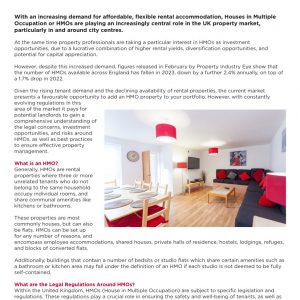The term HMO, short for House in Multiple Occupation, is one that is becoming increasingly familiar to both those who are looking for a place to live as well as to residential landlords who are looking for a new investment opportunity. But what classifies a property as an HMO?
The majority of HMOs consist of rental properties, either houses or flats, which are shared by three or more tenants that do not belong to the same household who rent rooms within the property and share communal facilities such as a kitchen or bathroom. A household in this context refers either to family members who are living together or to single people who live alone.
In addition to the above mentioned houses and flats, examples of other properties which may also be classed a HMOs include:
- Employee accommodation
- Shared houses
- Private halls of residence
- Hostels, lodgings and refuges
- Blocks of converted flats
Furthermore, buildings which either contain numerous bedsits with some shared facilities or flats with their own facilities, but which are not self-contained, could also fall into the category of being considered an HMO.
What HMO landlords need to be aware of
HMOs play a vital role on the UK property market, where there is an increasing demand for affordable and flexible accommodation. However, aspiring HMO landlords do need to be aware of some key aspects to ensure their investment pays off.
Possible planning restrictions
With the rise in demand for HMOs, especially in university towns and other heavily built up urban areas, Local Authorities are putting measures in place that give them the ability to require planning permission for any property that is being converted into an HMO. This is done through what is called an Article 4 direction, which allows them to restrict property conversions that would otherwise fall under permitted development right, or PDRs.
The Article 4 direction gives the local planning authority the ability to control the development of new HMOs to a greater extent, and is likely to be seen in areas where a large number of HMOs already exist.
Licensing and compliance
Many HMOs, especially those considered large HMOs, require a license. An HMO is considered large if it is occupied by six or more tenants forming more than one household and the toilet, bathroom or kitchen facilities are shared between the tenants.
As well as the need for licensing, additional legal responsibilities are placed on HMO landlords that go beyond the usual requirements of protecting deposits and meeting energy efficiency regulations. These additional rules are primarily based around health & safety and fire protection, but are also focussed on maintaining a good quality of living.
Some of the responsibilities HMO landlords are required to adhere to are:
- Ensuring the property is not overcrowded
- Ensuring there are sufficient cooking and bathroom facilities based on the number of tenants
- Ensuring the structure of the building, utilities and communal areas are maintained to a good standard
- Ensuring sufficient rubbish bins are provided, based on the number of tenants
- Carrying out an annual gas safety check
- Carrying out a Electrical Installation Condition Report (EICR) every five years
- Ensuring adequate fire safety measures are in place
HMO landlords are also required to makes sure that out Right to Rent immigration checks are carried out for any adults tenants.
If an HMO is unlicensed or the landlord does not comply with their responsibilities, they could face penalties as non-compliance is considered a criminal offence.
How AWH can help
HMOs play an important part of the UK property market and as they have the potential to provide higher rental yields than standard buy-to-let properties, they make for an excellent investment opportunity.
When considering making an investment in any class of property, knowing the true value of the property is extremely important. Our Residential Valuation team have decades of combined experience valuing residential properties across London and the South East. Speak to a member of the team on 0800 071 5517 or email admin@awh.co.uk.
Get even more insights
Find out more about what is involved in owning an HMO with our Thought Leadership article “A Guide to Houses in Multiple Occupation“.
In this article, we take a more in-depth look at the HMO market, including aspects such as:
- The Legal Regulations Around HMOs
- The Benefits of Investing in HMOs
- Key Factors in Buying an HMO
- Key Considerations for Managing an HMO
Get the article



